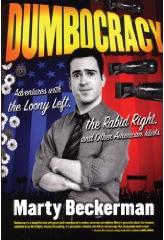Arizona's Prop. 101 is good medicine for bad politicians
Sometimes the best way to preserve freedom is to tie people's hands -- government people, that is. That's what Arizona's Proposition 101 would do when it comes to health care. Designed to prevent officials from dragooning state residents into a government-mandated health care system, the measure would write into the state constitution a ban on passage of any law that "restricts a person's freedom of choice of private health care systems or private plans of any type."
I'll admit here that I have a bit of a personal interest in the passage of this measure. My wife is a physician -- a pediatrician -- in Arizona who owns her own practice. She's already horrified by the extent to which the government has inserted itself into the provision of medicine. She and I both consider health care to be overregulated under existing law, and consider many of the flaws of the health care system in this country to be direct result of busybody politicians' efforts to "perfect" the provision of medicine with mandates, bans and rules of all sorts.
Prop. 101 wouldn't undue existing regulations, I'm sorry to say. But it could potentially block a worst-case scenario by preventing our ever-meddlesome political class from deciding that the skills they've put to such good use in driving Arizona into a massive budget deficit could also be applied to designing an oh-so-clever health care system that's so attractive that people have to be forced to participate under threat of law.
I'm struck by the difference in tone between the official arguments for and against Prop. 101. The "for" arguments all mention the virtues of personal freedom and the benefits to innovation and responsiveness to be found in systems that avoid the rigidity of top-down design and government control.
Dr. Anthony K. Hedley, president of the Arizona Institute for Bone & Joint Disorders, writes:
As an orthopaedic surgeon, I have devoted most of my adult life to eliminating the pain and suffering that patients immobilized by severe joint disease must endure. Many of these patients have come to me from other countries, such as Canada, where their health care systems make them wait months, and sometimes years, to get the kind of surgical intervention that Americans expect to receive in a timely manner.
Dr. Robert F. Spetzler, a neurosurgeon, adds:
Many nations--and now many of the states of OUR nation--have made attempts to deal with the problem of the uninsured. But what frightens me is that in most--if not all--of these instances, the reforms have resulted in restricting the ability of patients to choose their own doctors; or to seek a new and innovative form of therapy-or an alternative form of therapy; or to get a second or third opinion; or to purchase the type of health insurance plan that best suits their needs.
By contrast, the "against" arguments dwell on the supposed perils of changing the Constitution to prevent the government from doing stuff to us in the future that we might not want it to do, but would be good for us. Oh, and they say socialized medicine is too a great thing.
Says Dr. Jonathan B. Weisbuch and Dr. Mary Ellen Bradshaw, the chair and co-chair, respectively, of the Arizona Coalition for a State and National Health Plan:
An Amendment limiting future legislation is dangerous. No one can predict what laws may be needed to improve the health of Arizonans. ... The Proposition's goal, to prevent abuses associated with "socialized" medicine, is irrational. The only "socialized" medical programs in the US are the Veterans Health System, the Indian Health Service, and military medical services. None abuse the private sector. Socialized systems are funded by the Government. They provide services in government facilities by professionals who work for the U.S. Public Health Service. No one is abused by "socialized medicine" in America.
For the record, from speaking with doctors who have worked in all three systems, and patients who have endured treatment under all three, I can say with confidence that the VA and the military provide, at best, sub-standard care, and the Indian Health Service is a tour through third-world hell. I'd say the patients in those systems are "abused."
But if you want care under systems such as those, you should be free to choose them -- and the rest of us should be free to opt for care under competing arrangements.
As for the idea that "an amendment limiting future legislation is dangerous ..." You know, the best parts of both the federal and state constitutions do just that. I'm talking about the Bill of Rights (Declaration of Rights in Arizona), which provide a laundry list of things the government can't do. We didn't trust the government with a free hand on free speech, property rights and search and seizure protections, and there's no reason to keep politicians unrestrained when it comes to maintaining our freedom to make our own health care choices.
Proposition 101 isn't a cure-all. There isn't any such thing. But it could be an effective roadblock to further incursions by the government into one important area of personal liberty.
Labels: economic liberty, health care





